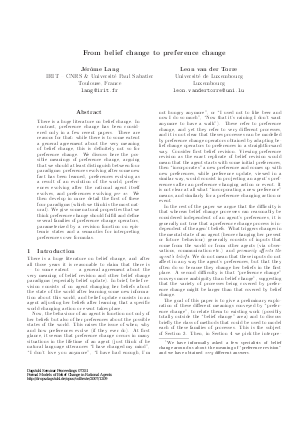From belief change to preference change
Authors Jérôme Lang, Leendert van der Torre
-
Part of:
Volume:
Dagstuhl Seminar Proceedings, Volume 7351
Part of: Series: Dagstuhl Seminar Proceedings (DagSemProc) - License:
 Creative Commons Attribution 4.0 International license
Creative Commons Attribution 4.0 International license
- Publication Date: 2007-11-20
File

PDF
DagSemProc.07351.13.pdf
- Filesize: 255 kB
- 8 pages
Document Identifiers
Subject Classification
Keywords
- Beliefs
- preferences
- decision making
- agents
- preference revision
Metrics
- Access Statistics
-
Total Accesses (updated on a weekly basis)
0Document
0Metadata
Abstract
There is a huge literature on belief change. In contrast, preference change has been considered only in a few recent papers. There are reasons for that: while there is to some extent a general agreement about the very meaning of belief change, this is definitely not so for preference change. We discuss here the possible meanings of preference change, arguing that we should at least distinguish between four paradigms: preferences evolving after some new fact has been learned, preferences evolving as a result of an evolution of the world, preferences evolving after the rational agent itself evolves, and preferences evolving per se. We then develop in more detail the first of these four paradigms (which we think is the most natural). We give some natural properties that we think preference change should fulfill and define several families of preference change operators, parameterized by a revision function on epistemic states and a semantics for interpreting preferences over formulas.
Cite As Get BibTex
Jérôme Lang and Leendert van der Torre. From belief change to preference change. In Formal Models of Belief Change in Rational Agents. Dagstuhl Seminar Proceedings, Volume 7351, pp. 1-8, Schloss Dagstuhl – Leibniz-Zentrum für Informatik (2007)
https://doi.org/10.4230/DagSemProc.07351.13
BibTex
@InProceedings{lang_et_al:DagSemProc.07351.13,
author = {Lang, J\'{e}r\^{o}me and van der Torre, Leendert},
title = {{From belief change to preference change}},
booktitle = {Formal Models of Belief Change in Rational Agents},
pages = {1--8},
series = {Dagstuhl Seminar Proceedings (DagSemProc)},
ISSN = {1862-4405},
year = {2007},
volume = {7351},
editor = {Giacomo Bonanno and James Delgrande and J\'{e}r\^{o}me Lang and Hans Rott},
publisher = {Schloss Dagstuhl -- Leibniz-Zentrum f{\"u}r Informatik},
address = {Dagstuhl, Germany},
URL = {https://drops.dagstuhl.de/entities/document/10.4230/DagSemProc.07351.13},
URN = {urn:nbn:de:0030-drops-12099},
doi = {10.4230/DagSemProc.07351.13},
annote = {Keywords: Beliefs, preferences, decision making, agents, preference revision}
}
